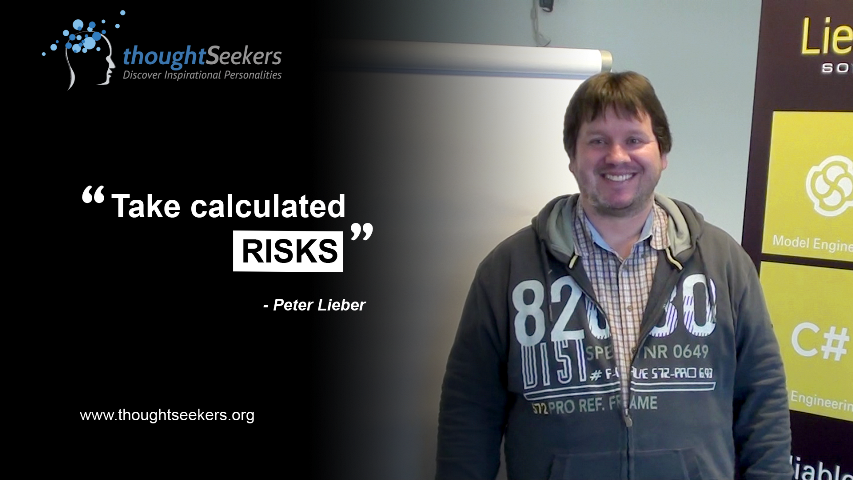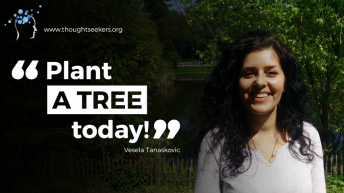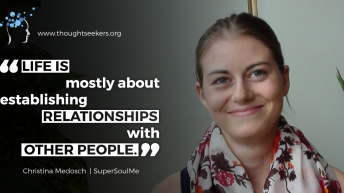Peter Lieber, thoughtSeeker
Our team met serial entrepreneur Peter Lieber at a conference in Vienna.
He founded countless successful companies in Tech. His rich insights and experience came in form of very practical pieces of advice.
Who are you and what do you do?
I started founding companies at the age of 17 in the field of technology. In the past nobody thought about computers as a potential to ease future work because they were really big back then. I started my business with Borland. Borland is one of the most famous companies in the software industry especially for software development tools. I was the youngest employee that Borland had back then. I decided back then that I want to make Austria more famous, this is why I tried to make my business in Austria and did not go to the US for example. Therefore I brought Borland and Delfi in Austria’s companies at the age of 17. I started as self-employed, that was my very first beginning. Up to now I have found 12 companies: 9 of them are running very well and three of them are bankrupt. Part of the game is sometimes also to get bankrupt. The most of the bankruptcies were caused through partnering with the wrong partners, which led me to decide to go more on my own, believe in myself and in my strengths. The most famous company I found was Sparx Systems. Sparx Systems has about 320.000 licenses, we sold alone in the European market around 20.000 licenses. It’s a very successful company I am proud of.
Tell us about one big learning you had
The sparkling moment for me was when I founded Exinis. It counted up to 870 or 880 persons on the payroll. We managed to get one big customer which we told: “You are not able to run your business without us” This customer was HP and HP said that we are too small for them. They said they don’t need us. From one day to the other we lost our biggest customer because of our arrogance. We tried to show that we are the best and that they need us and so on. Nothing worked and the learning for me was not to rely on only one customer.
But his was not the only learning I had from this experience. We needed three years to quit the company because there were no other customers like HP that needed our services in the capacity we delivered to HP. It failed not only because of our arrogance and not only because of that big customer we lost. We have been 6 partners; every partner had a 16% to 50%, so it was a really amazing mixture. Nevertheless, it was not easy to find a common decision or a common opinion for the company. And what happens if you do not have a common opinion? Nothing. Actually you have 6 companies within one company, which will soon lead to crash.
Failure is a very enriching experience but the even more enriching experience is to find out what happens to yourself if your company fails. In the past a lot of people had the opinion that if you failed a company, you are not able to work anymore, you are chained. Therefore you are really afraid of becoming bankrupt and you are very afraid to put all your money inside your venture. Now I found out that actually it’s nothing like this, you are not going to be chained automatically if you try out things. And if it comes to a moment when you fail, you have a chance to stand up again. And this is exactly what I have done: I stood up again and built up a new business. It took me up to two or three years to get back in the business again. But now it’s working very well. The only thing is to be careful with your bank and your bank connections. You might need to change your bank after a failure.
What about family in the busy entrepreneurial life?
I started with my family business very early. With 22 I had my first child. This was a very important change in my life because in the past freedom was the most important thing for me. I have never been employed, except in my own company. And it was the most important thing in my life to have the freedom to decide what I wanted to do. I don’t want to have a boss that tells me to go left or to go right. I want self-manage myself. With my first child this changed a little bit because I found out that I have to take care of others. I also realized I needed to secure a little bit of finances on the side to be able to save enough money to be sure that my child can grow up. And now I have five of them I need to be responsible for.
How did you come to the business idea that you are currently pursuing?
My business is software for software developers. That’s our niche and we are playing with the software developers face to face. Always when I try to make a business out of the scope/area of my business, I fail. Therefore, my initiatives in the field of events, software for end users, software for other businesses is not my business. My business is software for software engineers and for system engineers. Because I understand their language, I know their issues, I know their problems in and out, this is my focus.
What are the challenges you face?
The major challenge is to find the right people. In addition to that, my personal challenge is that I am working only around 30% in the project. Therefore, I need always guys working together with me that go to the end of the way and implement it to the end. I usually try out of idea so long until I see that it will work, after that I am not so interested anymore. That’s my major challenge. So I know if it will work, it could work, I am not really interested anymore, I am keen on the innovative side of it, on the implementation challenge; after this is theoretically and partially also practically solved, I lose a bit of the focus.
What motivates you?
I influence the development of my companies but the directions, the strategy are not exactly written in a book or standard rule to follow, it depends a lot on how the company acts, how the people in the company act and in the end how do they grow up and how do they develop themselves. Ultimately, I like that the companies I run can sustain themselves. From my point of view, companies are like children.
Where do you get the power from?
I am very self-motivated
I don’t know exactly, but I am very self-motivated. I know that I have a very high motivation to work and to move something, to show the people that there is a movement in the market. I try not only to make my business visible, but to show others what can happen in the entrepreneurship area. It’s a high motivation to show what can be achieved. I like movement, I like change.
What would be three important pieces of advice for the people reading this right now?
The major advice would be to “take risk”, but not too much. Find the right balance for yourself. If you have partners, you must know that not all the partners have the same value system. It impacts the participation in the company and it might decrease the motivation to work for the company. If you are not aware about these, you will divorce, change, everything will crash. Therefore, be very careful to find out what’s the personal value system of your partners. If you don’t find it out, this often the surprises occurring out of it will break you.
Believe in your idea but know that it’s not very important. If you find that your idea is not working don’t insist on it, because it might as well never work; often you might need to change it. It’s very important to have the ability to leave something on the side if you find out that it will not work. Don’t hassle around and do everything for the idea, it’s a big opportunity cost, you have enough power, enough ideas to find something else that might work. There is a good book on this “blue ocean strategy” to find blue oceans for your business.
What are your goals in life, what do you want to achieve in life in the end?
I am not sure; I am still searching the thing I want to achieve. Years ago I said I want to become a civil servant in Brussels. That was one of the ideas because I have seen that the lot of customers especially big companies like IBM, HP, ATOS or SEIMENS now try to be part of the system and sometimes lack know-how or better said, the civil society lacks know-how on how to approach complex technological concepts. Another idea was to involve myself in politics but I am not interested anymore in the political systems; I realized that in politics you cannot move as many things as you can move as an entrepreneur.
What were your biggest failures until now?
My biggest failures were only the moments when I trusted persons who motivated me to work with them together, to start something together. While working together I realized that our expectations were not matching. In the past I failed also because I enjoyed the commodity of not thinking about from where the money came from, I just focused on the product and not on the business as such; which is not enough, despite how much fun is the product and what a burden sometimes managing the company seems to be. You need both to succeed.
What was your biggest success until now?
My biggest success was to go to Australia and bring this software to Europe. If this software belonged to an American company, business in Austria would have never succeeded; the cultural difference is too big. The interesting story is that Australian culture is similar to the Austrian one, in the end it’s just one letter difference, right? The software I brought from Australia to Austria would have not ran if I brought it to a different market, like for example Germany, because the behaviour and the mind-set of the business is very similar between Austria and Australia. It’s a bit lazy, but focused. And when I mean lazy, I actually mean something like “oh! Just be cool”, “it’s okay to bill a bit late on this or that” or “to invest in the strategy”, “it’s okay to fail sometimes”; it’s more easy-going. In America if you fail, they always say “fail three times then you are a good manager”, but you are not allowed to fail in their company, you have to fail before joining them. So it’s similar but different in the same time somehow.
What are your life principles?
My life principle is to be able to trust until the end again and again; if somebody abuses that trust, you still have to be able to trust in general; because if you don’t, you will never gain new trust with new business partners; what I basically mean is not to let bad experiences from the past influence the new business opportunities of the present and future.
I always at first did, then believed and ultimately said. With time I understood that it might not be the right order. Now I have learned to believe first, then talk about it and ultimately do it. My major failures were always that I started by doing first. Doing first means that you do things without truly thinking about them, without talking about with nobody. But if you do believe first, then talk and then do, you have a better chance not to fail. I always try to first believe, second say and third, do.
What is your own recipe for success?
As there is no recipe, there are just principles. If I had the recipe then I would for sure be able to write it down. I think the most important thing is that you should know that what you are able to do. And what you are not able to do is much more important than to know what you are able to do.
What would you personally improve in the world so that it’s a better place to live for us all?
I think that the most important thing in the world is to learn to become self-motivated. Wake up with an idea, go to bed with an idea and know that yes, you can do it.
Who are the people who supported you the most?
There were many people that supported me in each phase of my life, I always tried to learn as much as I could from them. Usually, my mentors were 10 or 20 years older than me and they had a special mind-set.
Final words for the viewers/listeners/readers?
My last sentence after a presentation is typically “find your own ocean, be very successful but not in my ocean”. Good Luck!







Add comment